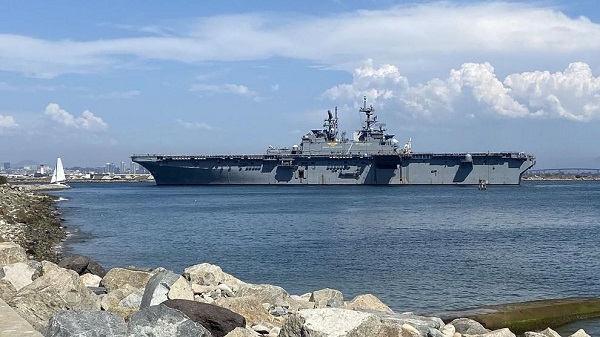Crime
Bystanders Tried To Help Charlotte Stabbing Victim In Her Dying Moments


From the Daily Caller News Foundation
Newly released footage from the murder of a Ukrainian refugee in Charlotte, N.C. captures the moments when bystanders tried to help her as she bled on the floor of a public train.
Passengers gathered around in an apparent attempt to massage Iryna Zarutska’s wounds after she was fatally stabbed on the night of Aug. 22, as shown in extended video footage released Tuesday by Headline USA. The suspect, a mentally ill homeless man with a lengthy criminal record, now faces local and federal charges and could be put to death if convicted in federal court, the Department of Justice (DOJ) announced Tuesday.
🚨🚨 US Attorney of the Western District of North Carolina said that Iryna Zarutska’s family told the Ukrainian Embassy they would bury her here because “she loved America.” @DailyCallerpic.twitter.com/lNoboqSLhT
Dear Readers:
As a nonprofit, we are dependent on the generosity of our readers.
Please consider making a small donation of any amount here.
Thank you!
— Nicole Silverio (@NicoleMSilverio) September 9, 2025
The assailant, identified as DeCarlos Brown, is seen on surveillance video seated behind Zarutska for several minutes before suddenly standing up, raising his arm and stabbing her three times. Zarutska, 23, looked up in shock as the stabber began pacing around the train, blood dripping from him.
Zarutska put her face in her hands and slowly tipped over, falling unconscious, as the suspect remarked, “I got that white girl. I got that white girl,” the video shows. One of Zarutska’s stab wounds was to the middle of her throat, according to a police affidavit. Brown was later found on an outbound platform for the light rail system, police said.
After passengers gathered around Zarutska, a young man was seen laying her on her back as blood began spilling across the floor of the train and appeared to wipe her neck with napkins. One person was heard exclaiming, “Oh, my God” as others became aware of the situation.
Another man and woman bent over to assist the young man, who temporarily took off his shirt to apply it to Zarutska’s body. The group of bystanders was seen lifting her body toward a wider space on the floor of the train as they waited for police to arrive.
Zarutska emigrated from Ukraine with her family to the U.S. in 2022 to escape Russia’s invasion of the country, according to her obituary. Her family has chosen to have her buried in the U.S. because “she loved America,” U.S. Attorney Russ Ferguson said Tuesday.
Brown had at least 14 prior arrests on his record and was released from jail in January on a “written promise to appear” after being charged with misusing the 911 system during one of his mental episodes. Brown’s mother told local media that he had a history of aggressive behavior and should not have been allowed on the streets.
The DOJ said Tuesday it has not ruled out the possibility of civil rights charges for the murder. “We will seek the maximum penalty for this unforgivable act of violence — he will never again see the light of day as a free man,” Attorney General Pam Bondi said in a statement.
Crime
Public Execution of Anti-Cartel Mayor in Michoacán Prompts U.S. Offer to Intervene Against Cartels

“I don’t want to be just another mayor on the list of those executed”
On the first night of November, during Day of the Dead celebrations, the independent, anti-cartel mayor of Uruapan in Michoacán, Carlos Manzo, was assassinated in the heart of his city during a public festival. His bloody murder has underscored the deadly risks faced by local officials who may lack adequate protection from a state that critics say is corroded by corruption and penetrated by powerful cartel networks that, in some regions, have supplanted government authority. The killing intensifies urgent questions about political and police corruption, cartel impunity, and the scope of U.S.–Mexico security cooperation — with a response from the U.S. State Department today offering to “deepen security cooperation with Mexico.”
Manzo, a fiercely outspoken anti-cartel mayor who took office in 2024 as Uruapan’s first independent leader, was gunned down as he stood before crowds at the annual Day of the Dead candlelight celebration. Witnesses said gunfire erupted shortly after Manzo appeared onstage, holding his young son moments before the attack. The festival, known locally as the Festival de las Velas, drew hundreds of families to Uruapan’s central plaza — now transformed into the scene of Mexico’s latest high-profile political assassination, and a catalyst for nationwide outrage, as online protests surged and citizens called for demonstrations against cartel violence.
According to early reports, at least two suspects have been detained and one attacker was killed on site. Authorities asserted — despite the success of the attack — that Manzo had been under National Guard protection since December 2024, with additional reinforcements added in May 2025 following credible threats to his life.
In Washington today, the killing drew political reaction. “My thoughts are with the family and friends of Carlos Manzo, mayor of Uruapan, Michoacán, Mexico, who was assassinated at a public Day of the Dead celebration last night. The United States stands ready to deepen security cooperation with Mexico to wipe out organized crime on both sides of the border,” Deputy Secretary of State Christopher Landau, the former U.S. ambassador to Mexico, said in a statement shared online.
Federal Security Minister Omar García Harfuch said the gunmen “took advantage of the vulnerability of a public event” to carry out the attack, despite a standing security perimeter.
President Claudia Sheinbaum condemned the killing as a “vile” assault on democracy and vowed there would be “zero impunity.” Her administration convened an emergency security meeting and pledged that the investigation would reach the “intellectual authors” of the crime. Yet the murder has already ignited outrage across Mexico over the government’s failure to protect local officials in cartel-dominated states such as Michoacán, where extortion, assassinations, and territorial disputes continue to erode basic governance.
Manzo had publicly warned of his fate. “I don’t want to be just another mayor on the list of those executed,” he said earlier this year, as he pressed the federal government for better coordination between municipal and military authorities. For years, Uruapan — an agricultural and trade hub in western Mexico — has been the site of deadly clashes between the Jalisco New Generation Cartel and remnants of the Knights Templar Organization, both vying to control lucrative extortion and drug routes.
The killing of Manzo fits a dark and familiar pattern. In 2025 alone, several mayors in Michoacán, Guerrero, and Tamaulipas have been killed in attacks widely attributed to organized-crime groups. In June, the mayors of Tepalcatepec and Tacámbaro were ambushed and slain while traveling in official convoys. More than 90 local officials have been murdered since 2018 — a rate that analysts say reflects how cartels target municipal governments to ensure political control over territories tied to narcotics, mining, and agriculture. Uruapan, at the heart of Mexico’s avocado belt, is a strategic prize for the cartels that tax every shipment leaving the region.
The mayor’s death also recalls earlier tragedies that scarred the nation. In 2012, Dr. María Santos Gorrostieta Salazar, the former mayor of Tiquicheo, was abducted and murdered after surviving two assassination attempts and defying cartel threats. Her death became emblematic of the dangers faced by reformers who refuse to cooperate with criminal groups. More than a decade later, Manzo’s murder illustrates that little has changed — except the brazenness of the attackers, now willing to strike in front of cameras and families celebrating one of Mexico’s most sacred holidays.
The killing has also reignited long-standing U.S. frustration over Mexico’s inability to stem cartel violence, even as the Trump administration has expanded counter-narcotics operations at the border. Under Trump’s renewed directives, the U.S. has classified several Mexican cartels as foreign terrorist organizations and empowered the Pentagon to develop strike options against high-value targets abroad. A September 2025 joint statement between Washington and Mexico City pledged deeper intelligence sharing and cross-border enforcement initiatives, including efforts to halt arms trafficking southward.
However, Mexico’s government remains deeply wary of any U.S. military involvement on its soil. President Sheinbaum has warned that “Mexico will not stand for an invasion in the name of counter-cartel operations,” rebuffing Republican calls for unilateral action. Her position lays bare a long-standing tension between Mexico’s need for U.S. support and its insistence on sovereignty — a fault line that Manzo’s killing has reignited.
The Bureau is a reader-supported publication.
To receive new posts and support my work, consider becoming a free or paid subscriber.
Crime
Canada Seizes 4,300 Litres of Chinese Drug Precursors Amid Trump’s Tariff Pressure Over Fentanyl Flows

In what appears to be the second-largest Chinese precursor-chemical seizure in British Columbia in the past decade, Canadian border and police officials announced they intercepted more than 4,300 litres of chemicals used to manufacture fentanyl and other synthetic drugs at a notoriously troubled port in Delta, B.C.
The announcement of a seizure that occurred in May 2025 comes amid President Donald Trump’s continuing pressure on Ottawa to crack down on fentanyl trafficking in the province — which U.S. officials say has become a key production and shipment point for Chinese and Mexican traffickers.
The seizure — announced jointly by the Canada Border Services Agency (CBSA) and the RCMP — underscores the scale and persistence of global trafficking networks funnelling illicit materials into Canada’s drug markets.
According to the agencies, border officers examined two marine containers that arrived from China in mid-May, both bound for Calgary, Alberta. Acting on intelligence developed by CBSA’s Pacific Region, officers discovered 3,600 litres of 1,4 Butanediol, a key ingredient for producing GHB, often known as the “date-rape drug”; 500 litres of Propionyl Chloride, a chemical precursor used to synthesize fentanyl; and 200 litres of Gamma Butyrolactone (GBL), another controlled intoxicant.
The chemicals were concealed inside 60 clear jugs and 20 blue drums within the containers. Investigators believe the shipment was intended for use in clandestine drug laboratories. The RCMP confirmed that an investigation into the importation network remains ongoing.
The seizure comes amid growing concern about Canada’s port security, particularly in Metro Vancouver, where experts and local officials say criminal networks are exploiting gaps in federal enforcement.
The Delta seizure follows a series of major CBSA operations targeting precursor chemicals at Pacific ports. In May 2022, CBSA officers in the Metro Vancouver District examined a container from China declared as “toys” and discovered 1,133 kilograms of the fentanyl-precursor chemical Propionyl Chloride, with the potential to produce more than a billion doses of fentanyl.
Public Safety Canada also reported that in the first half of 2021, CBSA seized more than 5,000 kilograms of precursor chemicals, compared with just 512 kilograms in 2020 — reflecting what officials called a “dramatic escalation” in attempts to smuggle fentanyl inputs into the country.
In 2023, the City of Delta released a report highlighting major vulnerabilities at port terminal facilities, warning that there is “literally no downside” for organized criminals to infiltrate port operations. The report noted that British Columbia’s provincial threat assessment rated ports as highly susceptible to corruption and organized-crime infiltration.
At the time, Delta Mayor George Harvie called the lack of a dedicated national port-policing force “a threat to national security.” In comments to the Canadian Press, Harvie said that while Canada’s ports fall under federal jurisdiction, the “total absence of uniformed police at the facilities makes them obvious targets for criminal elements — from Mexican drug cartels to biker gangs.”
“We’re witnessing a relentless flow of illegal drugs, weapons and contraband into Canada through our ports, and that threatens our national security,” Harvie said.
The Port of Vancouver complex, which includes major terminals in Delta, Surrey, and Vancouver, handles roughly three million containers annually, with millions more expected as port expansion plans move forward.
The Delta report reiterated how difficult it has become to police these sprawling operations since the Ports Canada Police were disbanded in 1997. More than a quarter-century later, Harvie said, the consequences of that decision are now “alarmingly clear.”
The CBSA announcement today comes as U.S. President Donald Trump has imposed tariffs on Canadian exports, accusing Ottawa of failing to interdict the flow of fentanyl and precursor chemicals trafficked through British Columbia ports. Washington has repeatedly pressed Canada to strengthen port enforcement and anti-money-laundering controls, citing the West Coast’s role in China- and Mexico-linked trafficking networks.
Simultaneously, in trade negotiations with Beijing, Mr. Trump announced a reduction in tariffs tied to the fentanyl supply chain — raising concern that Washington has eased pressure on China, the primary source of finished fentanyl now responsible for hundreds of thousands of overdose deaths across North America.
Subscribe for free to receive new posts and support my work.
For the full experience, please upgrade your subscription and support a public interest startup.
We break international stories and this requires elite expertise, time and legal costs.
-

 Business16 hours ago
Business16 hours agoCBC cashes in on Carney as the news industry playing field tilts further in its favour, crippling the competition
-

 Energy2 days ago
Energy2 days agoThawing the freeze on oil and gas development in Treaty 8 territory
-

 Business2 days ago
Business2 days agoWhat Pelosi “earned” after 37 years in power will shock you
-

 Business2 days ago
Business2 days agoOttawa should stop using misleading debt measure to justify deficits
-

 Agriculture7 hours ago
Agriculture7 hours agoFarmers Take The Hit While Biofuel Companies Cash In
-

 Agriculture17 hours ago
Agriculture17 hours agoThe Canadian Food Inspection Agency’s Bloodlust for Ostriches: Part 2
-

 International2 days ago
International2 days agoLarge US naval presence in Caribbean reveals increased interest in western security
-

 International1 day ago
International1 day agoBBC uses ‘neutrality’ excuse to rebuke newscaster who objected to gender ideology





